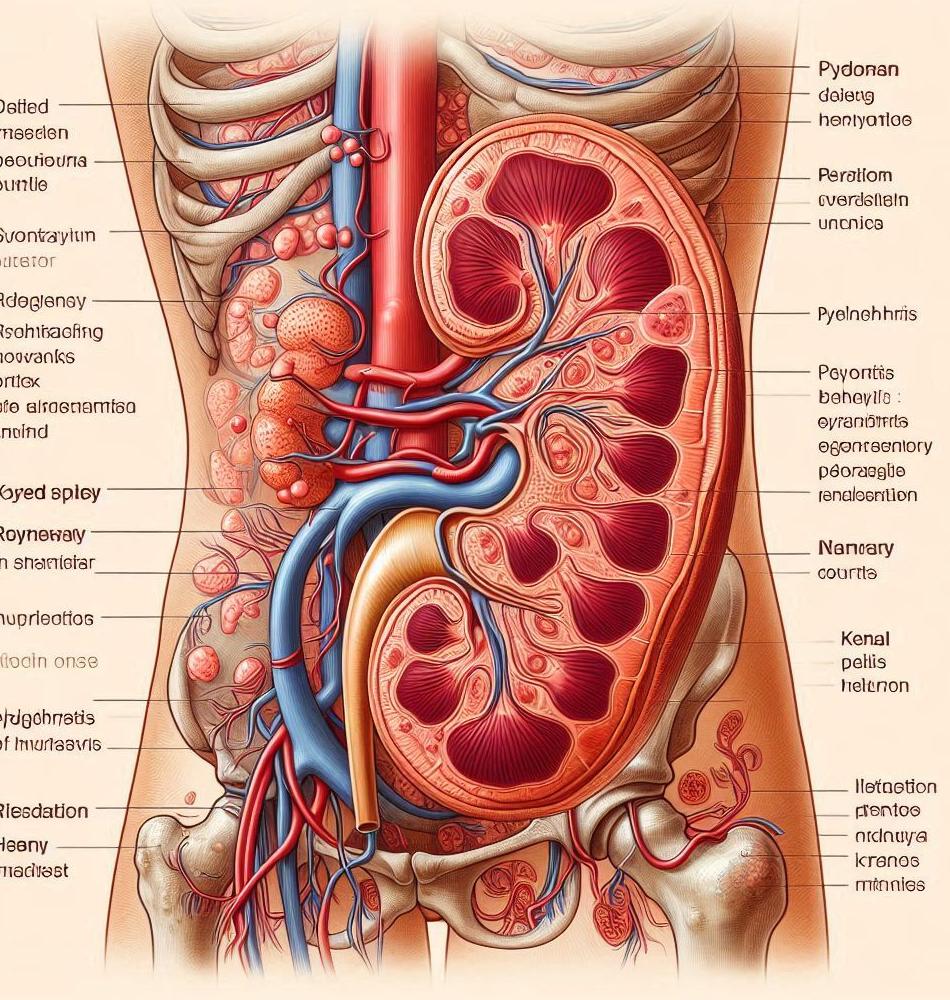Understanding Pyelonephritis and Its Impact on the Body 💉
Pyelonephritis is not just a medical term that rolls off the tongue, but a condition that can profoundly impact one’s health and well-being. Many people, often unaware of its severity, brush off the symptoms until they escalate. This article will delve into how pyelonephritis affects the body, exploring its causes, symptoms, complications, and treatment options.
What is Pyelonephritis? 🔍
Pyelonephritis is an infection of the kidneys that typically begins in the urinary tract before spreading to one or both kidneys. It can be acute, appearing suddenly, or chronic, developing gradually over time. Understanding this condition is crucial as it can lead to serious health complications if left untreated.
Causes of Pyelonephritis 📈
The underlying causes of pyelonephritis can be categorized into several key areas:
- Urinary tract infections (UTIs): These are the most common cause, often stemming from bacteria that enter through the urethra.
- Kidney stones: These can obstruct the urinary tract, leading to an increased risk of infection.
- Pregnancy: Hormonal changes and physical pressure from the baby can lead to urinary tract complications.
- Weakened immune system: Conditions such as diabetes or HIV can make individuals more susceptible to infections.
- Anatomical abnormalities: Some people are born with structural abnormalities that can increase the likelihood of pyelonephritis.
Symptoms of Pyelonephritis 🚨
Recognizing the symptoms of pyelonephritis is essential for timely intervention. Common symptoms include:
- Fever and chills: A classic indicator of infection and the body’s response.
- Pain in the back or side: This pain often presents in the flank area, where the kidneys are located.
- Nausea and vomiting: Gastrointestinal symptoms that can accompany the infection.
- Frequent and painful urination: A strong desire to urinate, accompanied by pain, is a common sign.
- Cloudy or foul-smelling urine: The presence of bacteria can alter the appearance and odor of urine.
- Blood in urine: Hematuria, or blood in urine, can also occur in some cases.
How Pyelonephritis Affects the Body 🌍
1. Immune Response 🚑
When pyelonephritis occurs, the body's immune system springs into action. White blood cells rush to the site of infection, causing inflammation. This immune response is beneficial but can also lead to increased pain and discomfort.
2. Impact on Kidney Function 🏥
If pyelonephritis goes untreated, it can damage the kidneys over time. This may lead to chronic kidney disease, where the kidneys can no longer function effectively. Monitoring kidney function in individuals with a history of pyelonephritis is essential to mitigate this risk.
3. Systemic Effects 🔄
The infection can have systemic effects on the body, leading to symptoms like fever, fatigue, and malaise. Particularly in severe cases, bacteria can spread into the bloodstream, resulting in a condition called sepsis, which is life-threatening and requires immediate medical attention.
Complications of Pyelonephritis ⚠️
Ignoring pyelonephritis can lead to severe complications, including:
- Chronic kidney disease: Prolonged infections can impair kidney function over time.
- Sepsis: A serious body-wide response to infection that can lead to organ failure.
- Kidney abscess: A localized collection of pus in the kidney, which can require surgical drainage.
- High blood pressure: Ongoing kidney issues can contribute to elevated blood pressure levels.
Diagnosis of Pyelonephritis 🩺
Diagnosing pyelonephritis typically involves a combination of methods:
- Medical history: Discussing symptoms and health history with a healthcare provider.
- Physical examination: Assessing for fever and tenderness in the kidney area.
- Urinalysis: Testing urine for the presence of bacteria, blood, or pus.
- Blood tests: Analyzing blood for signs of infection and kidney function.
- Imaging studies: In some cases, ultrasound or CT scans might be used to assess the kidneys.
Treatment Options for Pyelonephritis 💊
Depending on the severity and type of pyelonephritis, treatment options can vary:
1. Antibiotics 💊
Antibiotics are the first line of treatment. They target the underlying bacterial infection and help alleviate symptoms. It’s vital to complete the prescribed course, even if symptoms improve before finishing the medication.
2. Hospitalization 🌟
In severe cases or if complications arise, hospitalization may be required. Patients may receive intravenous antibiotics and fluids until they stabilize.
3. Pain management 💁♀️
Pain relief measures can include nonsteroidal anti-inflammatory drugs or acetaminophen to help alleviate discomfort.
4. Treatment of underlying conditions 🌿
If pyelonephritis is linked to an underlying issue such as kidney stones or anatomical abnormalities, addressing these concerns is crucial to prevent recurrence.
Frequently Asked Questions ❓
- What are the long-term effects of pyelonephritis?
- Can pregnant women get pyelonephritis?
- Is pyelonephritis contagious?
- How can pyelonephritis be prevented?
- What is the difference between acute and chronic pyelonephritis?
Conclusion 📝
Pyelonephritis is a potentially serious kidney infection that can affect the body in multiple ways. From immune response to kidney function, its impact can be profound. Awareness of the symptoms and prompt medical attention can greatly improve outcomes and prevent complications. Maintain regular check-ups with your healthcare provider, especially if you have a history of urinary tract issues. Remember, early intervention can save both your kidneys and your health.
.png)






